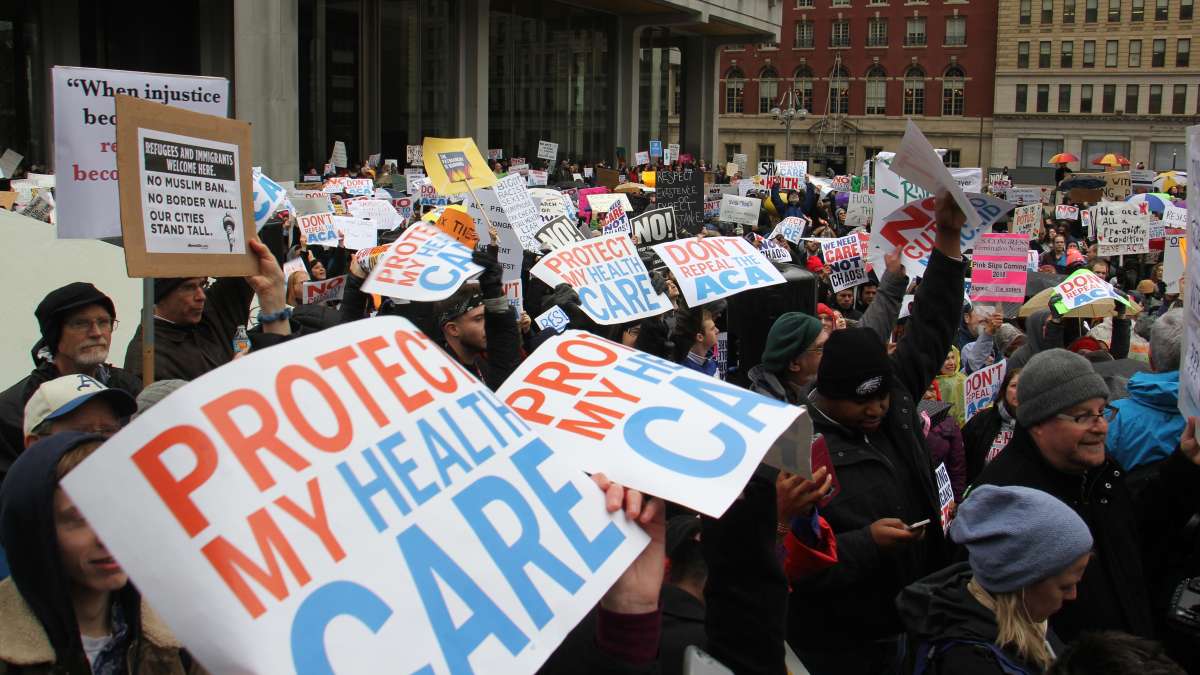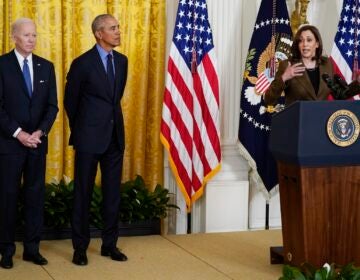Health care must be provided communally

Protesters gather at Thomas Paine Plaza on Thursday afternoon under a steady drizzle. (Emma Lee/WHYY)
Every once in a while, when I write something in defense of the Affordable Care Act, or point out that repealing it will lead 1.1 million Pennsylvanians to lose their insurance and 3,425 to die each year as a result, someone comments, “I pay for my own health insurance. Why should I pay taxes for anyone else’s?”
Every once in a while, when I write something in defense of the Affordable Care Act, or point out, as the Pennsylvania Budget and Policy Center recent reported, that repealing it will lead 1.1 million Pennsylvanians to lose their insurance and 3,425 to die each year as a result, someone comments, “I pay for my own health insurance. Why should I pay taxes for anyone else’s?”
I often ignore those comments for two reasons. First, unless the writer has an individual income over $200,000, or a family income over $250,000, he or she is not paying taxes for the ACA. And, second, if someone doesn’t share the notion that we all have a moral responsibility to guarantee that everyone has access to high-quality, affordable health care, I’m not sure what I can say to change their mind. If Matthew 25, where Jesus proclaims “I say to you, as you did it to one of the least of these my brothers, you did it to me,” can’t convince them, what can I say that will move them?
But there is another, slightly more complicated, way to look at this issue that might do so. No one really pays for their own health care in the United States or any other advanced country. Health care is always provided in large part by social insurance.
Consider that:
1. The federal government spends an enormous amount of money supporting research on health care. That research has led to many new pharmaceutical and surgical treatments for disease.
2. The federal government supports the training of doctors through its support of teaching hospitals and grants and loans to doctors in training.
3. Most of the hospitals in the country, especially in rural areas, would not exist in their current form, or at all, without federal support.
4. And most importantly, the almost 60 percent of people who get health insurance through their employer receive a massive tax break, because unlike their wages, the benefits of receiving health insurance are not taxed. If you have to purchase health insurance on your own, you do it with after-tax, not pre-tax dollars. The cost of that tax break is $250 billion a year, which is 2.5 times the cost of the ACA.
5. And because of that tax break, 60 percent of Americans buy health insurance as a part of a large group, which means that they can secure it even if they have a pre-existing condition.
Why do we have all these programs? Because the risk of serious and costly illness is so severe, yet the likelihood of any of us getting a particular illness is so small, that we simply can’t insure ourselves against all possible threats to our health by ourselves. To see that, imagine what health care would look if none of those federal programs that support health care and health insurance existed.
1. There would be no employer-based, group insurance. We would all have to buy insurance on our own. The cost of that insurance would vary with our medical condition. So almost no one with serious medical problems would be able to afford health insurance. Anyone who got a serious medical condition would be dropped from their insurance. That would especially be true for people who have diseases that are unusual or costly to treat.
2. There would be far fewer major medical centers, and none would be found outside our major cities.
3. While there would likely be hospitals and doctors available to treat the diseases that afflict large numbers of people — heart disease, diabetes, COPD, some cancers — there would be little or no financial incentive for doctors and hospitals to develop the expertise to treat unusual diseases or conditions or for pharmaceutical companies to develop drugs for them. That would, by the way, include the majority of diseases, including the majority of cancers.
4. Private research institutes and drug companies would have little incentive to undertake the risky research that sometimes leads to a medical breakthrough, but often leads to knowledge that brings no immediate financial return.
Social insurance, in which we as a community take on a large part of the cost for uncertain research, hospitals, and physician training, and provide the subsidies for health insurance, is the only way we can guarantee that all of us have access to high-quality, affordable health care.
The ACA isn’t the first program that asks people to pay for health care of for other people (as well as themselves). It is, however, the one that extends the full benefits that 85 percent of our fellow citizens already receive from our taxes to the 15 percent who do not.
If you oppose the ACA and are in a very high income bracket, you’re not trying to stop the government from spending your taxes on the health care of other people. That’s already happening. You certainly don’t oppose spending my tax money — and the tax money of the uninsured, since they all pay taxes — to pay for your health care. That’s also already happening. What you oppose is using your tax money to help the uninsured take advantage of what we collectively provide to those of us who already have insurance.
The ACA is about including everyone in the social insurance that you and most Americans receive and that all of us already pay for as a community. How dare you tell me that you have no obligation to pay your share?
—
Marc Stier is the director of the Pennsylvania Budget and Policy Center.
WHYY is your source for fact-based, in-depth journalism and information. As a nonprofit organization, we rely on financial support from readers like you. Please give today.




